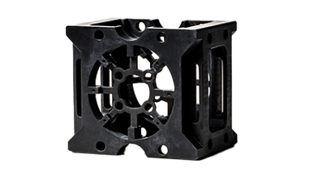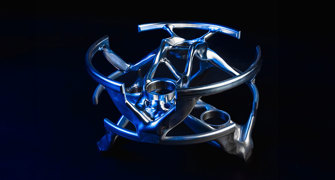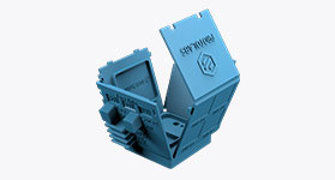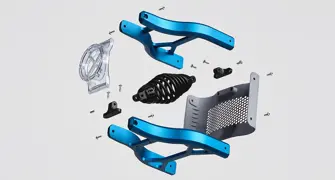Smart Manufacturing Enables Mass Customization Trend
In the digital age, whether it’s a sneaker, the color of your car’s upholstery, or a smartphone, people want a singular consumer experience that feels tailored to them. And they want their distinctive products created and delivered quickly.
The instantaneous allure of social media and the sprawling online marketplace have cultivated a customer base that is no longer willing to wait to get exactly what they want. And studies have found that consumers will pay more for the privilege of personalization.
One-size-fits-all mass production has given way to mass customization and product personalization. And digital manufacturing plays a crucial role in this game-changing transition. It is a transition that shifts from companies giving consumers what they think their customers want, to customers choosing specifically what they are willing to pay for and how fast they want their product delivered. Digital manufacturing provides on-demand parts to companies, creating agile product development at those companies and enabling them to offer much more personalized choices to their customers.
At the recent New York Times International Luxury Conference, Qiu Yafu, the chairman of the Ruyi Fashion Holding Group, delivered an eye-opening keynote address where he predicted that the fashion world would undergo a significant transformation as companies tap big data and other technologies to make consumers the center of what he called the ecosystem rather than at the end of the chain of raw materials, manufacturing, retail, and commerce.
The idea that technology will move the consumer to the very center of the production process rather than the end is a revelatory concept, but one that any modern company will be best served to address.

Mass Customization Emerges
How’s the fashion industry finding a fit for this trend? At the 2019 Met Gala in May, Protolabs 3D printed garments and accessories for designer Zac Posen, which were worn by model Jourdan Dunn and several actresses. The rose gown Dunn wore was made of 21 plastic rose petals attached to a wearable titanium cage. And while the bold artistic statement made by the dress was more important than functionality, digital manufacturing helped the designer achieve his creative vision while making Dunn stand out amidst a sea of over-the-top dresses. “I’ve worn nothing like this before,” said Dunn, who has been to the gala 10 times in the past. “It feels like I’m wearing art that is very expensive and very hefty.”
Whether it is the design of a plastic smartphone case or the color of the iconic swoosh on a pair of Nikes, customers demand options. They want their finished product to look special and unique. Customers want to make the final choices on how the product they are buying looks, feels, and functions, not have a company select it for them. By providing these companies tackling mass personalization with customized, tailored parts in commercial-grade materials—and delivering them often within days—digital manufacturing plays a pivotal role in companies being able to cater to the specific demands of their clientele during each step of the customization process.
Nike is continually at the forefront of product personalization and customization. In November, they opened a flagship store on Fifth Avenue in New York called the Nike House of Innovation 000. The 68,000 sq. ft. store is focused entirely on the customization demands of the shopper, where “buyers have a consultation with experts, who subsequently create the shoes on-site in labs, with the ‘hidden in plain sight’ tone of an open kitchen.” Digital manufacturers will provide various prototypes and components that will allow Nike to be able to customize their products on site, while quickly satisfying the specific demands of their customer base. Technology plays a key role in streamlining the customer experience, putting the product choices and also payment options directly at shoppers’ fingertips.
These interactive shopping experiences foster a thoroughly modern connection between the brand and the consumer, creating a distinctive, personal experience both while they are shopping in addition to the customized goods they purchase. Digital manufacturing makes these connections smooth and seamless, shrinking the time between a customer deciding upon a personalized product and the company being able to deliver their customized selection directly to them.
Nike’s chief design officer, John R. Hoke III, wants consumers to think of the brand “as a platform and a dialogue versus simply a place to transact and receive goods.”

Personalization and customization also play key roles in the consumer electronics industry, especially for small devices such as smartphones and tablets. These products often require periodic upgrades as technology changes, which also demands rapid customization. Indeed, studies have shown that the younger the consumer, the greater their appetite for frequent product upgrades.
Wearable fitness trackers are prime examples. Fitbits, Garmin fitness trackers, Apple watches, and others require regular upgrades and the cycle of new model introductions is frequent.
This constantly changing technology and shorter product life cycle trend also is related to the growing popularity of connected products collectively known as the internet of things (IoT), which, again, calls for customization. Household products such as home climate controls and outside lighting and security systems are good examples. Additionally, medical-device companies, which used to put out a product that would be good for eight or nine years, now have various products that interface with your iPhone or tablet, so these items need to be upgraded every two or three or four years. Accordingly, companies in these industries are under the gun to accelerate how they do innovation and shorten those product life cycles.
It is clear that mass customization and product personalization has engaged the modern consumer, with 86% saying in a recent study that customization has some appeal and 62% willing to pay more to customize their products. On-demand choices and multiple product options are now expected of a company by the consumer, rather than it being viewed as an exclusive special service provided to the few.
On-Demand, Low-Volume, High-Mix Production Supports Customization
As different industries move forward to address the technological challenges and shifting consumer expectations of the future, digital manufacturing will be at the forefront in assisting companies to meet the demands of the marketplace while satisfying the specific needs of their customers. Digital manufacturers must be able to provide speed and flexibility to companies with low-volume, high-mix production and on-demand manufacturing that supports customization.
“Mass customization for consumer products via accessories is an application Protolabs supports,” said Dan Barsness, Protolabs Vice President of Product Management and E-Commerce. “Our digital manufacturing process provides market-leading mold costs, which permit our customers to cost-effectively create and test product variants.
“In addition to mass customization for consumer applications, Protolabs supports many B2B companies to meet the exact needs of their end customers. For example, companies with catalog products may want to offer special features or packaging for key customers. Our B2B mass customizers tell us our low cost and short lead times is one of their secret weapons to win big projects.”
As Protolabs CEO and President Vicki Holt said in a 2018 article in Industry Week, “the biggest barriers to mass customization [are] conventional thinking and fear of change.” The flexibility and speed of digital manufacturers will help companies modernize their business model, while easing any fear of change or conventional thinking that might hold their products and profits back.
Millennials lead the way in seeking out products that can be customized and personalized. So, the modern marketplace must be able to service the needs of these young people who want to be given plenty of choices when it comes to the products they buy. Twentieth century approaches to mass production will no longer be viable in the 21st century, where mass customization and product personalization continue to grow in popularity and availability.
According to an April 2018 YouGov survey, 26% of U.S. consumers have personalized a product. And this personalization extends to an array of products and services: Clothing, food and beverages, technology products—especially items such as smartphones and tablets, vacation and travel experiences, and household goods. Modern consumers are looking for a personalized, unique experience in all facets of their lives. Companies in every industry must cater to the specific needs of their customers or risk getting left behind in favor of businesses that provide customization and personalization in an era where consumer choice is everything.
Erik Thompson is a Minneapolis-based journalist.





